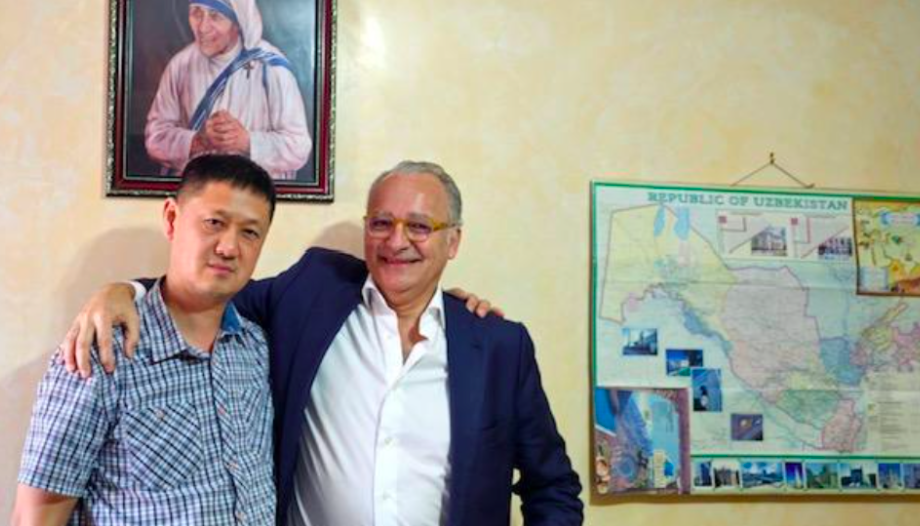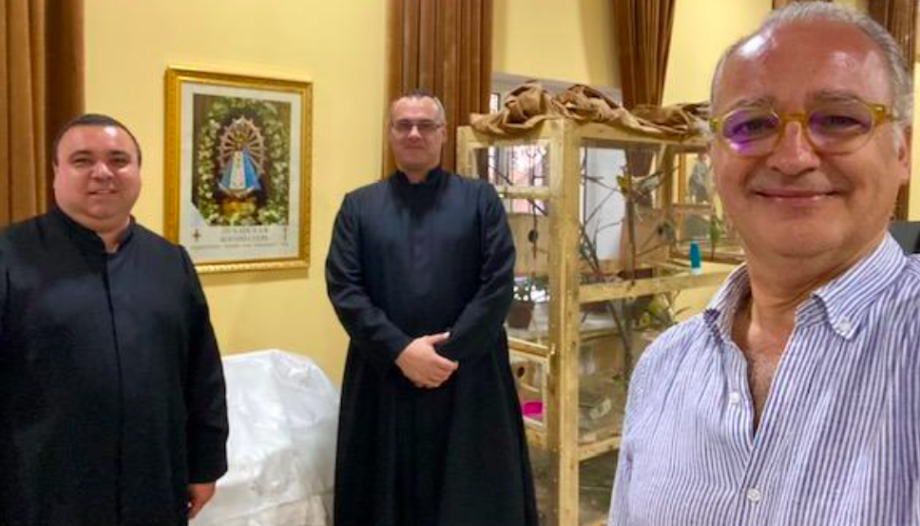I have published several reviews on my professional stays in two Central Asian countries, in legal seminars organized by the European Union, within the program LEICA (Law Enforcement In Central Asia) that took place last January and April 2024. This publication is not of a professional nature, but its purpose is to relate my experience in a very important aspect of my life.
Central Asia, with its rich history and cultural diversity, has witnessed the presence of various religions throughout the centuries, having suffered especially the Marxist persecution of the USSR to all forms of public worship of any religion during the decades in which these peoples and the five nations that make up this region (which are known in Spain as the "tanes" republics because of the ending in "tan" of their names, which have gone unnoticed for us) have lived under the Soviet regime.
In this article I narrate my personal experience with the people of these countries, from whom I highlight their correctness, education and availability "to help you in whatever you needed", something that happened to me every so often, because in addition to the difficulty of the language -I only understood them in the farewells, when they knew I was Spanish, they would say 'Barsa" or 'Hala Madrid' - I was also "lost and disconnected", without wifi and without data (so the cell phone was only useful to check the time and take pictures) and, specifically, my experiences in the cities of Almaty (Almaty) and Almaty (Almaty).Kazakhstan), Tashkent and Samarkand (Uzbekistan), where the Christian community - to which I will now refer - has left a significant mark, which today remains, with its restrictions and limitations, very present.
Kazakhstan
In Almaty, the largest city of Kazakhstan, in addition to the Cathedral of the Holy Trinity (the same name as the Archdiocese created by Pope St. John Paul II), there is also the Bishop's Chapel, José Luis Mumbiela (born in Monzón, Huesca), president of the Episcopate of Central Asia, who has dedicated his life to priestly service, first in a parish in Lleida and now in this region.
To be able to attend the Eucharist, taking communion in both species, and other acts of worship in that chapel was a luxury, especially because I coincided with the First Communion of a young Kazakh and I could see the sincere exteriorization of a community of people, many of them converts from Islam. I was impressed by the story of Polish origin, after the Stalinist deportation, of Our Lady of Peace (Virgin of Ozornoye, patroness of Kazakhstan) who appears in a painting in which she and the Child Jesus are seen, both with Kazakh features, to whom the miracle of the fish in a frozen lake is attributed.
Also in Almaty, in the house АЛЛМАРАСАН (Almarasan), a center of Opus Dei that serves as a place of residence, study and meeting for many young Kazakhs in that city, I also had the great privilege of attending the celebration of the Eucharist and participating in friendly gatherings with Spaniards and Hispanic Americans who work and live there. I felt very much cared for and I lived those days feeling the strength of the prayers of so many people for the healing of my nephew Juan who was very seriously ill due to a compartment syndrome and sepsis in one leg, all this derived from the fracture of the tibia and the rupture of an artery that he suffered during a soccer match in Asturias.
I thank God for these "communion of saints" and Santi de Lasala and Nico Zambrana who helped me so much and accompanied me during those days of the past harsh winter (at least for those of Mediterranean climate) with temperatures below zero.
Uzbekistan
In Uzbekistan, a land at the crossroads of cultures, the Catholic community is also present. In its capital, Tashkent, there is the Cathedral of the Sacred Heart and the convent house of the Missionaries of Charity of St. Teresa of Calcutta, dedicated to the poor and most needy, who celebrate the Eucharist every day at an early hour, allowing the rest of the day to be used for professional activities with the European and Asian colleagues who were summoned there.
Going to the monastery-residence of Mother Teresa's nuns means, first, to go into the suburbs of the city and, after passing the door of the street, to find an oasis of peace, love and prayer. It is a pleasure to see them all in their white and blue sari and to feel the grace of God in their prayers and their presence. It was providential that on the first day I met Valodia ("recommended" by Santi from Almaty), with his wife and son, who took such good care of me and who are so well known and dear to the women. sisters. I will never forget how attentive they all were to that Westerner with dark features who, without warning, showed up at Mass and with whom they shared many moments of community prayer. Sister Maria Kolbe, of Polish origin, was the means that the Lord gave me to feel so sheltered?

Having finished the work in Tashkent, after the closing and farewell to the authorities, attendees, organizers and the faithful English-Spanish-Russian translator, I traveled on my "free day" by train to Samarkand, a historic city known for its Islamic architecture, capital of the Silk Road and astrological science in the time of Tamorlan. I will never forget a couple of tourists from southern Russia who told me they were Muslims and were going to visit the impressive mosques of this city, with whom I shared the carriage and who helped me so much, even taking me in "their little Yandex" (cab via internet application), cramped and with all the suitcases on the seats (there, where three fit, four fit), to the hotel. In Samarkand is the Church of St. John the Baptist, attended by Fathers Ariel and Paul, born in Argentina (which is clear from the image of Our Lady of Lujan inside the church and in the home) who invited me to a delicious snack with dulce de leche, along with Cati, a young Uzbek girl who was being initiated into Christianity. Despite being a minority in a predominantly Muslim country, Catholics in Samarkand maintain their faith and the temple where the Sacraments are administered.
I thank God for the wonderful experiences he has given me in meeting with such wonderful people and with brothers and sisters in the Faith in such different and distant places, where God is the same Love all over the world. I had to tell about it.







